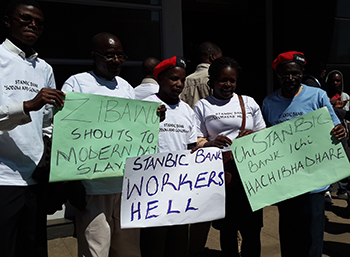


 ZIMBABWE’s troubled banking sector, which last year lost at least 1 500 jobs, could shed a further 1 000 jobs this year due to an escalating liquidity crisis in the country, a workers’ union for the sector has said. The Zimbabwe Banks and Allied Workers’ Union (ZIBAWU) said job losses last year were a result of either bank closures of financial institutions streamlining operations to survive an inclement environment.
ZIMBABWE’s troubled banking sector, which last year lost at least 1 500 jobs, could shed a further 1 000 jobs this year due to an escalating liquidity crisis in the country, a workers’ union for the sector has said. The Zimbabwe Banks and Allied Workers’ Union (ZIBAWU) said job losses last year were a result of either bank closures of financial institutions streamlining operations to survive an inclement environment.
“We fear for the worst,” said ZIBAWU assistant secretary general, Shepard Ngandu, who spoke as 250 workers became redundant after Transport Minister Obert Mpofu’s Allied Bank shut down after surrendering its operating licence to the Reserve Bank of Zimbabwe in a move that had been largely expected.
“Close to 1 000 employees lost jobs last year,” Ngandu told the Financial Gazette.
“If you add contract workers and other support staff who lost jobs, the figure will be over 1 500. The fear is this may continue affecting other banks. Interfin Banking Corporation is already going under liquidation. If the situation continues at this pace we may lose another 1 000 workers this year,” he said.
The banking industry, battered by non-performing insider loans, subdued business in a liquidity starved market and crippled by high nonperforming loans (NPLs), shaved a combined 37 percent of their post-tax profits during the year to December 31, 2013. And the crisis appears to be deepening as banks, mostly those controlled by locals, struggle to access recapitalisation lifelines due to declining confidence.
A survey by advisory firm, Econometer Global Capital, obtained this week warned that NPLs could climb to 26 percent this year, from about 18 percent in 2014. This could worsen pressure on the industry, which already has over US$925 million held by defaulting debtors. Over 70 percent of Zimbabweans polled by Econometer said they preferred mobile banking run by mobile telecommunications networks.
The preference for mobile banking is a blow to financial institutions, which have insisted the unregulated mobile money transfer market had significantly eroded their business. “The banking industry employed 6 000 workers last year. We are now at about 5 000. If we lose another 1 000 we will be at 4 000. It is not a good year for us,” Ngandu told the Financial Gazette.
Trust Bank went under liquidation in December following a long battle to find a suitor. ZB Bank, a unit of the Zimbabwe Stock Exchange-listed ZB Financial Holdings Limited, retrenched about 500 workers last year, Ngandu said, followed by Econet Wireless Zimbabwe-owned Stewart Bank, which retrenched 83 workers before losing its South African chief executive officer, Kwanele Ngwenya, this month.
Standard Chartered Bank also cut staff numbers, but its figures could not be immediately verified. Ailing Metbank concluded package deals with 70 workers who left during the previous year, but the banking institution failed to pay them as agreed by December 19, 2014. “Metbank has not honoured the payment plan,” said Ngandu.
He said the situation in the banking sector portended a worrying development this year. “People used to think banks were safe havens. But it is now catching up with bank workers. We are having banks failing to pay workers. There is generally poor corporate governance, and I am sorry to say this is more visible with local banks. They give themselves loans that they don’t pay, and loans to politicians. Some of their expansion plans are ill advised. They are not moving in the right direction,” said Ngandu.
Banks saw aggregate net interest margins retreat to 2,9 percent during the first six months of 2014, from 3,17 percent during the same period in 2013, as the sector responded to surging net interest expenses against declining interest income. NPLs, which have emerged as the biggest threat to banking sector stability, climbed to US$925 million against a US$5 billion deposit base, from about US$750 million in 2013.
Zimbabwe’s banks are among the most expensive to run, with an average cost to income ratio of 75 percent. Commenting on Allied Bank, Ngandu said: “What was left was just a shell. Managment lacked strategy. It was never fully capitalised. Now it is closed and 250 workers are left in the cold. For us it is a sad situation”.
During a visit to the ZIBAWU offices in Harare this week, the Financial Gazette witnessed several bank workers coming to lodge complaints against their employers, and these included workers from a troubled bank that could close unless a bailout meterialises in a few days. “This is what I mean when I say we are having sleepless nights,” said Ngandu.
“If their scheme of arrangement being negotiated doesn’t materialise within the next 10 days, it means 130 more workers will be jobless. This year is going to be a very difficult year for the banking sector.”
newsdesk@fingaz.co.zw